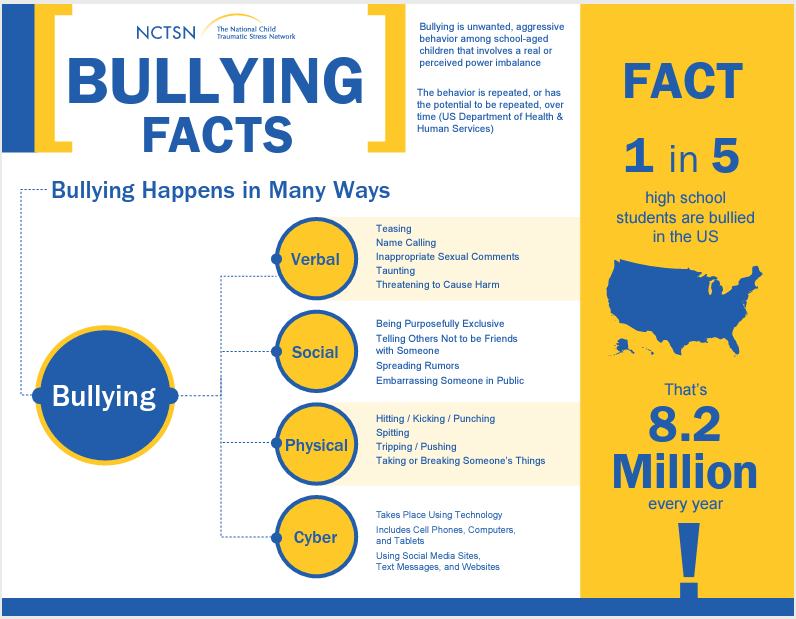Bully Prevention Tips for Parents of Middle School Students
Anti-bullying recommended books PK-12th grade
Standing up to bullies and building social-emotional skills bookshelf
Definition: Bullying is aggressive behavior repeated over time involving an imbalance of power. It can be physical, verbal, or emotional and can occur online or via cell phones (cyberbullying).


TIPS to Help Kids Understand Bullying (source: stopbullying.gov)
Encourage kids to speak to a trusted adult if they are bullied or see others being bullied. The adult can give comfort, support, and advice, even if they can’t solve the problem directly. Encourage the child to report bullying if it happens.
Talk about how to stand up to kids who bully. Give tips, like using humor and saying “stop” directly and confidently. Talk about what to do if those actions don’t work, like walking away
Talk about strategies for staying safe, such as staying near adults or groups of other kids.
Urge them to help kids who are bullied by showing kindness or getting help.
Watch the short webisodes and discuss them - PDF with kids.
Adults Want to Avoid These Mistakes: (source: stopbullying.gov)
Never tell the child to ignore the bullying.
Do not blame the child for being bullied. Even if he or she provoked the bullying, no one deserves to be bullied.
Do not tell the child to physically fight back against the kid who is bullying. It could get the child hurt, suspended, or expelled.
Parents should resist the urge to contact the other parents involved. It may make matters worse. School or other officials can act as mediators between parents.
What Teens Can Do (Source: stopbullying.gov)
SPEAK UP: If you feel uncomfortable with the comments or actions of someone… tell someone! It is better to let a trusted adult know than to let the problem continue.
Get familiar with what bullying is and what it is not. If you recognize any of the descriptions, you should stay calm, stay respectful, and tell an adult as soon as possible.
If you feel like you are at risk of harming yourself or others get help now!
Call 988
Call 1-800-273-8255 (TALK)
Visit the National Suicide Prevention Lifeline
Remember, bullying does not only happen at school. It can happen anywhere, including through texting, the internet, and social media. Cyberbullying can be SMS, Text, and apps, or online in social media, forums, or gaming where people can view, participate in, or share content and how to respond if it is happening to you.
Don’t respond to and don’t forward cyberbullying messages.
Keep evidence of cyberbullying. Record the dates, times, and descriptions of instances when cyberbullying has occurred. Save and print screenshots, emails, and text messages. Use this evidence to report cyberbullying to web and cell phone service providers.
Block the person who is cyberbullying.
Learn how you can be more than a bystander.